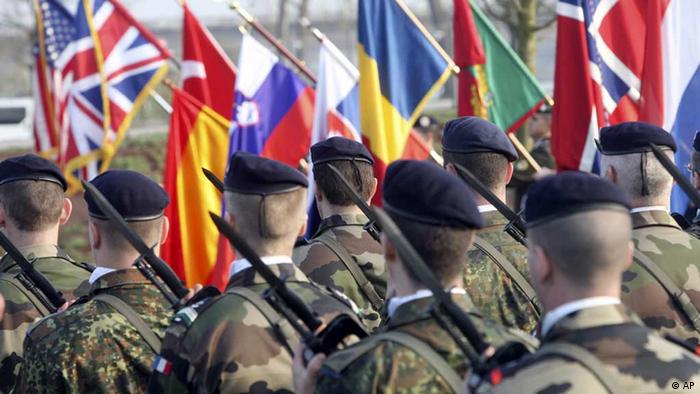The New York Times: 05. July 2014

Faced with a newly aggressive Russia, NATO has been mulling how to react, but it is ruling out one option: rapid expansion.
Four would-be members, including the former Soviet republic of Georgia, have been informed that admission to NATO isn't in the cards anytime soon. For some, that means dashed hopes. Macedonia's foreign minister told The Associated Press in a statement it was a "step backward."
The bottom line: The North Atlantic Treaty Organization, celebrating important anniversaries this year of a dozen nations joining its ranks, will welcome no new members when President Barack Obama and other leaders convene for a summit in Wales in early September.
NATO acting carefully
Analysts say that NATO members are worried about granting, or being perceived as granting, security guarantees that could quickly be tested by Russia. That's particularly true of Georgia, which has been waiting since 2008 for the U.S.-led military alliance to make good on its promise of admission.
Before taking over Crimea from Ukraine, Russia invaded and occupied two regions of Georgia nearly six years ago — and NATO is reluctant to take any action that might provoke a riposte from Moscow.
"The conflict over Ukraine has made it clear to them at NATO they have to be careful, both about security commitments and credibility," said Liana Fix, an associate fellow at the German Council on Foreign Relations. "If you give Georgia their membership action plan but don't defend them if something happens, what does it say about your credibility?"
NATO won't publicly hang up the "No Vacancy" sign.
Anders Fogh Rasmussen, the alliance's secretary general, proclaimed recently that "NATO's door remains open. And no third country has a veto over NATO enlargement."
But even before Crimea's annexation, some NATO countries were experiencing "enlargement exhaustion" and had become reluctant to increase the alliance's membership rolls, said Jorge Benitez, senior fellow for trans-Atlantic security at the Atlantic Council, a Washington, D.C.-based think tank.
Post-Crimea, "the issues are much bigger," Benitez said. "The question is, how much insecurity would you add to the alliance versus how much security would you bring to the alliance?"
For Georgia "substantive package"

To try to tilt the balance in its favor, Georgia has been an enthusiastic NATO partner, and until recently, had been fielding the largest non-NATO contingent of soldiers in alliance-led operations in Afghanistan.
In Wales, Georgia had been hoping to receive a formal action plan for membership, but instead will be given a "substantive package" to help move it closer to NATO, Rasmussen said. He declined to give details. But Fix said the package was likely to include stepped-up training programs, increased military cooperation and advice, and a detailed checklist of what NATO wants Georgia to do to qualify for membership.
Greece veto's Macedonian membership due to country's name dispute

NATO Secretary General Anders Fogh Rasmussen welcomes the Prime Minister of FYRO Macedonia Nikola Gruevski
The small Balkan nation of Macedonia was also assured of a membership invitation by NATO leaders six years ago, but will have to wait for the foreseeable future. The deal-breaker is an unresolved conflict over the country's name, which duplicates that of a Greek region. Since Greece is a NATO member and all 28 members must give their assent to admit a new nation, Athens has effective right of veto.
"Greece is acting from a position of power because it is a full member state," Macedonian Foreign Minister Nikola Poposki said in the written statement. Lamenting the "step backward," he said Macedonia will keep trying "to introduce sense into the Greek-Macedonian dialogue."
Montenegro's intelligence service seriously penetrated by Russia

Another former Yugoslav republic, Montenegro, is widely considered the candidate closest to achieving membership. Rasmussen said that by the end of 2015, NATO foreign ministers will assess whether "the time is ripe" to invite Montenegro to join. That deadline was the only one to come out of the July 24-25 Brussels meeting of foreign ministers that reviewed NATO's "open door" policy.
What was not spoken about publicly was the reason for NATO's delay: the reported penetration of Montenegro's intelligence service by the Russians.
"That was the sticking point," a NATO official told AP. He spoke on condition of anonymity because he was not authorized to speak on the record. He estimated the number of Montenegrin intelligence agents with links to Russia at between 25 and 50. Steps are already under way to neutralize their activities, he added, but that "it will take some time to manage."
Prime Minister Milo Djukanovic told his country's parliament that the decision on enlargement had been postponed because of "geopolitical reasons Montenegro cannot influence."

Drasko Djuranovic, an analyst, predicted a rise in anti-Western feeling in the small Balkan country.
"The majority of people who support Montenegro's membership in NATO will feel betrayed," he said.
Bosnia-Herzegovina, unable to pass a key condition set by the alliance

The fourth country classified as a NATO aspirant, Bosnia-Herzegovina, has been unable to pass a key condition set by the alliance: transfer of 63 defense facilities from local authorities to the central government, NATO officials said.
At a Monday news conference, White House deputy national security adviser Ben Rhodes encouraged the would-be alliance members to "stay on that track," even it if takes time.
"There's a reason that NATO is the best and strongest alliance that we've had in history, and the reason is that there's a very high standard of membership and there are very strong commitments that come with membership," Rhodes said. "So it's natural that there be an extended period in which nations work through those issues."
___
AP correspondents Misha Dzhindzhikhashvili in Tbilisi, Konstantin Testorides in Skopje and Predrag Milic in Podgorica contributed to this story.

No comments:
Post a Comment